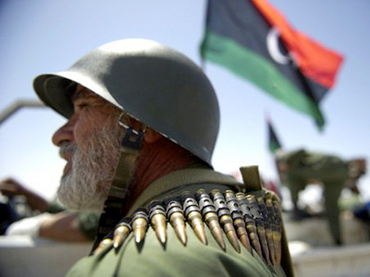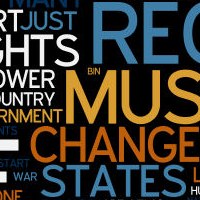![]()
Thu, July 07, 2011 | Rubin Reports | By Barry Rubin
Why Is the U.S. in Libya? Good Question
Listening to President Barack Obama talk about the administration’s Libya policy is a strange experience. He makes various arguments justifying the war there along the lines of: dictator Muammar Gaddafi is a bad guy, he has killed a lot of Americans in the past, and he was threatening to kill his own people so the United States must protect them.
As one listens to this, however, it seems as if even Obama doesn’t believe what his teleprompter is saying. The arguments are ridiculously transparent and if the media wanted to be critical they could tear Obama apart on the issue. First, Gaddafi was not a threat to U.S. interests at the time a decision was made to intervene. The reason why is important to remember. Whether or not the war in Iraq was a good idea, the fate of his fellow dictator, Saddam Hussein, scared Gaddafi badly. He was quick to play nice and turn over information on his nuclear program to the United States.
The Americans then accepted his “repentance.” It would be strange to put much moral commitment into a deal with Gaddafi. But for the record, the U.S. government did in a sense betray a promise to leave him alone if he left U.S. interests alone and didn’t subvert his neighbors or sponsor terrorism. Combined with the U.S. treatment of Husni Mubarak, dictators aren’t going to put much faith in the Obama administration’s promises. That’s one more reason why it seems to make more sense to be America’s enemy than its friend nowadays.
Second, while Gaddafi is a brutal dictator, rulers in Algeria, Sudan, Syria, Yemen, and other countries are equally willing to kill and torture their citizens. What the U.S. government must justify is why human rights violations in some countries deserve intervention and the same thing or worse in others don’t. Usually, the distinction is made on the basis of national interest. The regimes in Iran and Syria are enemies of America and thus helping their oppositions and subverting them should be of higher priority. An exception can be made in countries — Rwanda or Uganda under Idi Amin being two examples — when the repression is so bloody and horrendous that it should not be ignored.
What has happened — without any serious public debate! — is that the Obama administration has abandoned the main traditional determinants of U.S. foreign policy — especially a priority on national interests — that have been taken for granted by presidents of both parties for decades.
Aside from Obama’s poor justifications, there is a clever national interests argument made by defenders of the administration that the United States is intervening in Libya due to oil there. That seems reasonable, but I don’t think there is actual evidence to prove this was the White House’s motive, though it was a factor in European thinking that, in turn, did help shape U.S. policy.
I would suggest that the actual main reasons revolve around ideology. The administration is now obsessed with proving that it supports reform and democracy, having adopted a whole interpretation of the Middle East that accords with this concept. Ironically, the administration is doing this only after that view has been disproven by events, including the experiences of its predecessor. Remarkably, the very approach used by the Obama administration is one that its current leaders spent years ridiculing. Nevertheless, this contradictory situation seems to be what’s happening.
To show that America is “on the side of history,” the “masses,” and reform — also in line with the administration’s distaste for realpolitik — Libya seemed to be a great opportunity to pull another revolution as in Egypt and Tunisia. This time, however, the Obama administration would get even more credit — at least that’s what the White House thought. “Bad dictator removed by good president,” might be the headline.
Not knowing very much about American history, the Obama administration (and apparently the media and academics) doesn’t notice how often this approach has been carried out by previous presidents with poor results. The idea of making allies better to justify their being allies or making other countries better so they can be allies goes back to U.S. Cold War views of the 1950s. Such approaches were used to justify, for example, U.S. support for another Egyptian revolution (in 1952) that caused disaster as did the belief that Iran’s 1979 revolution would end by being benign.
There are many examples of this in U.S. Latin American policy of the 1960s and 1970s. President John F. Kennedy’s strategy in Vietnam (get rid of the bad dictator to show America’s friendship toward the people and its backing a “clean” ally) helped start that country into the downward spiral that was to claim so many lives.
The other key element in its thinking is that the adminstration expected that the Libya operation would be an easy one. By the way, that’s a key reason why the U.S. government was so quick to intervene militarily in Libya and so slow to even intervene verbally in Iran and Syria. Gaddafi must be unpopular, the “people” wouldn’t want him, so he’d be quickly overthrown. Having abandoned the national interests concept, the Obama administration really didn’t think through what might replace Gaddafi, just as it hasn’t factored in that point elsewhere.
Even the Arab League passed a resolution to get rid of Gaddafi, followed by the UN. Thus, unlike other potential targets, Gaddafi had no friends or allies. Neither Arabs nor Muslims would mourn him. A few weeks of bombing without any American casualties was expected to bring total victory. That’s why the White House didn’t deal with Congress or handle the War Powers Act issue.
Before any of those things caused trouble, Obama expected Gaddafi to be on his way to exile. Who will replace him? Someone nice, no doubt. Don’t the Arabs yearn for democracy and friendship with America? Isn’t Islam no problem at all? Won’t everyone inevitably like Obama? Of course, I am putting this in sarcastic terms — as used in the blogging style of writing — but fundamentally that is precisely what’s happening. Who would ever think of overthrowing a government — even a bad one — with no thought to what might come next and whether that could be even worse?
This answers the question of the U.S. war goal in Libya. It wanted to overthrow Gaddafi and install a friendly, moderate, democratic government. But since the rest of the world — which is allowed to define U.S. policy — wasn’t ready for that, Obama can never say so publicly.
Now the administration is stuck and has no way out. The war cannot be won without a significant escalation. There is no end in sight. Obama has no end game, no strategy, and absolutely no idea of what to do. And if you find that hard to believe just wait and see. The decision is not in the White House’s hands any more according to the Obama policy. It must continue to pursue the conflict in Libya until the rebels win. So their military fortunes, not U.S. interests, are in control of the situation.
Fortunately for the Obama administration, the war is costing little enough in money and casualties that it can get away with continuing the war and hoping for a rebel victory for quite some time. And since much of the media is pretty tame, it doesn’t have to worry about the kind of withering criticism faced by a George W. Bush over Iraq, much less a Richard Nixon over Vietnam. Pull out of Afghanistan, pull out of Iraq, and how can anyone complain about Libya?
Yet the Libya story is a perfect case study for this administration’s ignorance, incompetence, ideology, abandonment of traditional bipartisan foreign policy thinking, and wishful thinking. It is a trial run for the longer-term mess unfolding in Egypt and several other countries around the world. To study the Libya issue is to understand the Obama administration.



 RSS
RSS











Why Is the U.S. in #Libya? Good Question | #tcot http://bit.ly/nlNaiY
Why Is the U.S. in #Libya? Good Question | #tcot http://bit.ly/nlNaiY